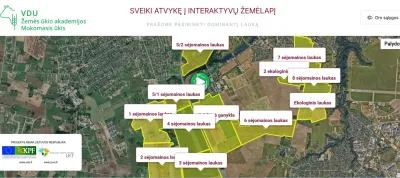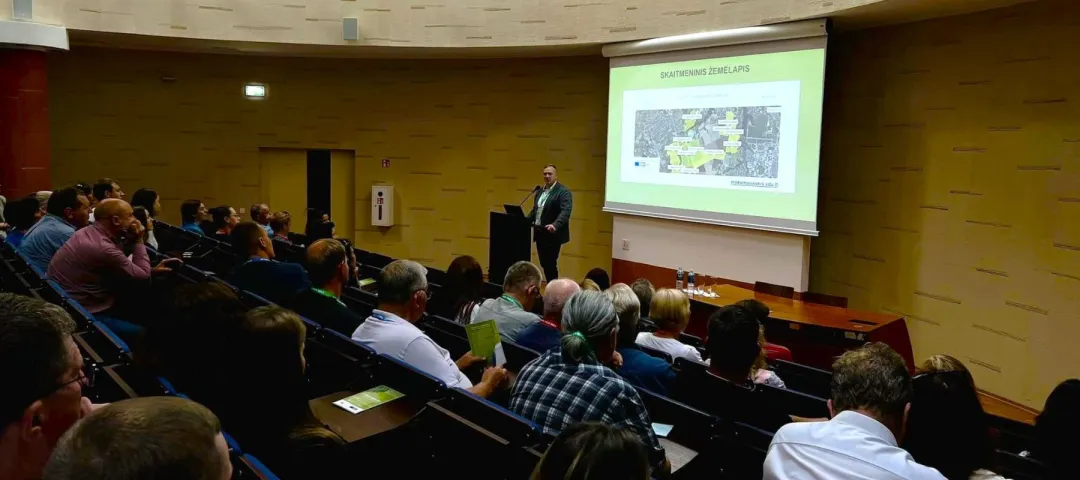General information
RDP Priority
- P1. Knowledge transfer and innovation
RDP Focus Area
- 1C: Lifelong learning & vocational training
RDP Measure
- M20: Technical assistance
Beneficiary type
- Public authority / body
Summary
Agricultural universities can play useful roles in fostering understanding about EU funding opportunities from the CAP for projects that benefit farm businesses individually and collectively. National networks provide forums to facilitate such actions. This has happened with the Lithuanian Rural Network and Vytautas Magnus University in a communication campaign using new digital tools and farm demonstration days promoting CAP funding opportunities for:
- climate-based sustainable regional development.
- organic food production and processing technologies.
- economic and environmental aspects of agricultural technologies.
Outcomes were channelled through three communication tools which contributed to efficient implementation of the CAP’s rural development funds:
- a thematic event-conference called Forum of Future Regions 2023.
- five seminar-style sessions on producing organic fertilisers from biomass waste on farms, featuring legal, technological and economic aspects.
- an Open Farm demonstration event supported by the launch of a new digital information service providing real-time information from field trails advancing sustainable farming practices. This digitised map motivates farmers to apply such practices on their farms as well and to apply for support from CAP funds for specific sustainable farming solutions on their farms.
Results
Project outcomes provided benefits for farmers, academia, and society. Key examples include the following:
- agri-scientists extended their outreach capacity to disseminate the latest information for farmers during events and through the digital interactive map.
- precision agriculture knowhow improved, e.g. on robotics, satellites, and IT solutions.
- 153 participants attended the Forum of Future Regions 2023 conference.
- 74 participants attended five seminars about organic fertilisers from biomass waste.
- 116 participants attended the Open Farm.
The ability to constantly monitor farm activities on the digitised map motivates farmers to apply such practices on their farms as well, and to apply for support from CAP funds for specific sustainable farming solutions on their farms.

Promoter
Vytautas Magnus University
Funding
Total budget 27 770 (EUR)
RDP support: 24 993 (EUR)
Private/own: 2777 (EUR)
Themen
Keywords
Ressourcen
Documents
Links
Context
Agricultural education bodies can play crucial roles in enhancing understanding of Common Agricultural Policy (CAP) funding opportunities among farmers in the EU. By developing tailored tools and educational programmes, these institutions can bridge knowledge gaps regarding CAP's complexities and benefits.
Workshops and seminars on business benefits from CAP funding can be run by university experts to provide farmers with practical insights into application processes, eligibility criteria, and, importantly, strategic alignment with sustainable farming practices.
Agricultural universities are uniquely positioned for providing such outreach, engagement and capacity building support to both future farmers and the existing agrifood workforce. This type of initiative can enhance farm resilience and promotes sustainable agricultural practices across the EU.
In Lithuania, the Vytautas Magnus University (VMU) is a keystone of the country’s agricultural education system. The University saw possibilities for improving access to the information that it organised about good farming practices for CAP funding.
Discussions on this topic via the Lithuanian Rural Network led to a package of coordinated communication actions being designed for increasing awareness through events and an online digital map. These centered on the University’s different ‘Open Farm’ demonstration plots where a range of good practice aspects of sustainable farming are being advanced.
CAP’s Technical Assistance budget from the Lithuanian Rural Network was used to co-fund most of this project, which also prioritised climate action and organic production.
Objectives
A strong strategic and national emphasis driving this project aimed to:
- inform potential beneficiaries and the public about implementation of CAP’s agriculture, forestry and rural development funding opportunities for Lithuania.
- implement communication tools promoting sustainable solutions in the agriculture and food sectors, which can be multiplied by effective use of CAP support.
- ensure the exchange of good practices to improve the quality of implementation of the CAP in Lithuania.
- encourage more active participation in rural development processes, mobilise participants and encourage all interested parties in information and knowledge dissemination processes.
- provide support to EIP activity groups, publicise their activities, and promote related innovations in agriculture, food production, forestry, and rural areas.
Activities
The following three main actions received CAP funding support:
- The conference ‘Forum of Future Regions 2023’ was organised at the VMU in Kaunas district. During this conference, presentations and discussions were held in three different areas: sustainable regional development in the context of climate change; organic food production and processing technologies; and technological, economic and environmental aspects of agricultural technologies.
- A series of five seminars was organised in five different counties of Lithuania for the promotion of ecological farming. When inviting targeted visitors, local activity groups were used whose members ensured that the subjects who participated in the events would be able to apply the knowledge gained in practice.
- The communication tool ‘Open Farm’ was organised, which is intended to familiarise regional representatives and the public with good farming experience and practices based on sustainable farming technologies and their benefits. The event took place in the fields of the Training Farm of the VMU in Kaunas district. It demonstrated a unique eight-year crop rotation applied on the farm. Such a farming model was important as an example of contributions to the European Green Deal.
Information publications were distributed during the event and a digital interactive map of the VMU Training farm fields was presented. It was made for spreading good practices and contains objective information about different crop production systems applied in each field (varieties, technologies, fertilisers, preparations, photo, video galleries) and their impact on farming.
The map is constantly updated and periodically supplemented with new functions. Currently, it is planned to install two broadcast video cameras for live views of the cattle farm. The digital map is now widely used. It benefits society by encouraging farmers to adopt such sustainable farming practices and seek CAP support for specific solutions on their own farms.
Main results
Project outcomes provided benefits for farmers, academia, and society. Key examples include the following:
- thanks to the map, VMU agri-scientists extended their outreach capacity to disseminate the latest information for farmers during events and through the digital interactive map.
- the project contributed to the popularisation of precision agriculture (introduction of robotic technologies, satellites, innovative IT solutions in agriculture) in Lithuania.
- 153 participants were attracted to the Forum of Future Regions 2023 conference.
- 74 participants during five seminar discussions heard about the production of organic fertilisers from biomass waste on farms; legal, technological and economic aspects.
- 116 participants attended the Open Farm communication event.
The VMU Training farm has encouraged other farmers to implement sustainable solutions on their farms. The ability to constantly monitor farm activities on the map motivates farmers to apply such practices on their farms as well and to apply for support from CAP funds for specific sustainable farming solutions on their farms.
Key lessons
Providing information through digital channels increases youth engagement in disseminating information about sustainable solutions in agriculture.
With the help of a digital map, real-time information can be presented conveniently, informatively, objectively and immediately throughout the agriculture seasons.
Digitised maps are useful for visually illustrating benefits and trends involved with different farming practices that are eligible for CAP funds.
Zivile Cerniauskiene

